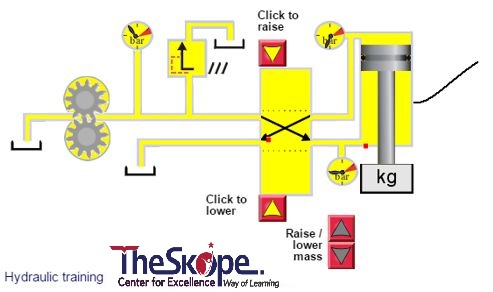Hydraulics Training: Master Basics to Intermediate Hydraulics
in Technical TrainingsAbout this training
Hydraulics Training: Master Basics to Intermediate Hydraulics
About This Training
Hydraulics is a cornerstone of industrial systems, powering everything from heavy machinery to precision manufacturing equipment. This one-day immersive training will guide you through the fundamentals and intermediate-level concepts of hydraulics, blending theoretical knowledge with practical applications. By the end of this course, you will have a solid foundation in hydraulic principles, components, and system troubleshooting techniques, enabling you to optimize performance and ensure system reliability.
Why Choose Our Hydraulics Training?
Our training program is designed to deliver a comprehensive understanding of hydraulic systems and their real-world applications. Whether you're an engineer, technician, or operator, this course provides the tools to design, operate, and maintain hydraulic systems effectively.
Once you complete this course, you'll have practical knowledge to immediately apply to industrial and technical challenges.
Course Highlights
Comprehensive Modules: Structured content covering hydraulic fundamentals, components, and troubleshooting.
Expert Instructors: Learn from experienced professionals with years of hands-on expertise in hydraulics.
Interactive Learning: Participate in practical exercises and case studies to reinforce your understanding.
Certification: Earn a certificate of completion to demonstrate your hydraulic expertise.
Who Should Attend?
Maintenance Technicians
Machine Operators
Mechanical Engineers
Plant Supervisors
Industrial Equipment Designers
Engineering Students
Why Learn Hydraulics?
Efficiency: Enhance system performance by understanding core hydraulic principles.
Troubleshooting Skills: Minimize downtime with improved diagnostic capabilities.
Cost Savings: Reduce repair costs and increase system longevity.
Career Growth: Build technical skills that are highly valued in industries like manufacturing, construction, and automotive.
Hydraulics Course Structure
1. Introduction to Hydraulics
Overview of hydraulics and its industrial applications.
Comparison of hydraulic systems with pneumatic and electrical systems.
Basic principles of fluid mechanics relevant to hydraulics.
2. Key Hydraulic Components
Pumps: Types, selection, and applications.
Actuators: Cylinders and motors.
Valves: Control valves, directional valves, and pressure valves.
Reservoirs, filters, and accumulators.
3. Hydraulic Fluids
Types and properties of hydraulic fluids.
Fluid selection criteria and maintenance.
Contamination control and fluid filtration.
4. Hydraulic Circuit Design
Reading and interpreting hydraulic circuit diagrams.
Basic circuit design principles.
Series vs. parallel circuits and their applications.
5. Troubleshooting and Maintenance
Common hydraulic system issues and their causes.
Preventive maintenance strategies.
Hands-on troubleshooting exercises.
6. Real-World Applications
Case studies of hydraulic systems in various industries.
Best practices for optimizing system performance.
7. Interactive Exercises
Practical activities to apply hydraulic concepts.
Group discussions and problem-solving scenarios.
8. Final Assessment and Certification
A short assessment to evaluate your understanding.
Certification awarded upon successful completion.
Testimonials
“This training helped me bridge the gap between theory and practice in hydraulic systems. Highly recommended!”
— Ramesh Gupta, Maintenance Technician ⭐⭐⭐⭐⭐
“Clear, concise, and practical—this course was exactly what I needed to improve my troubleshooting skills.”
— Sunita Mehra, Plant Supervisor ⭐⭐⭐⭐⭐
Enroll Today!
Take your knowledge of hydraulics to the next level with this one-day training. Gain the confidence to work with hydraulic systems in a variety of industrial settings.
Sign up now and unlock your potential in fluid power systems!
Certification Exam
Participants will complete a short assessment featuring multiple-choice and practical questions. A passing score of 70% is required for certification.
You can request a hard copy of your certificate for an additional fee of Rs. 100.
Comments (0)









